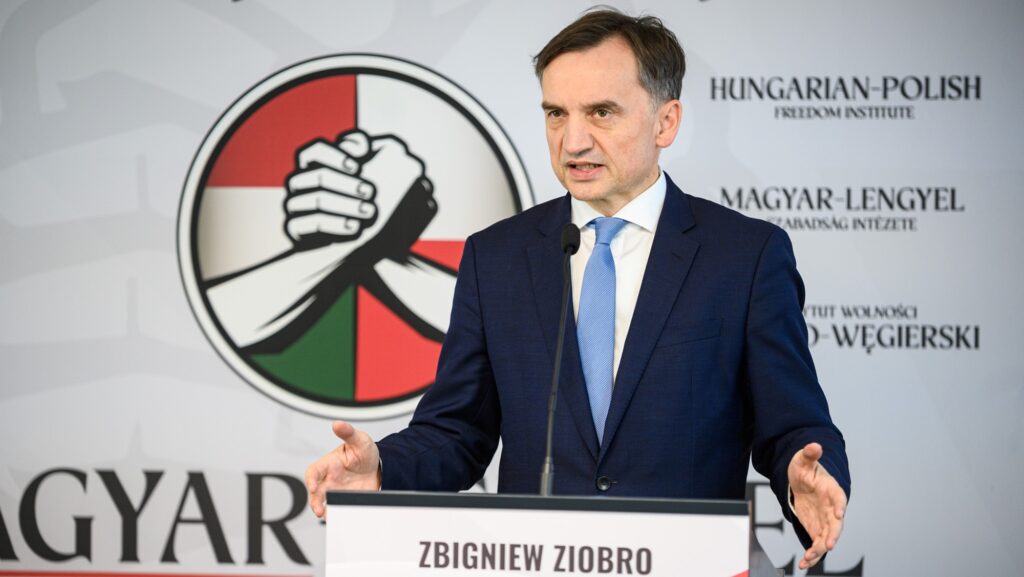In recent days, a major political event in Poland was the forced appearance of former Minister of Justice Zbigniew Ziobro before the parliamentary inquiry committee on Pegasus. The committee is investigating the purchase and use of the Israeli surveillance system by Polish special services during the Law and Justice (PiS) government.
For over 18 months, the Polish public has been bombarded with reports of the alleged ‘illegality’ of acquiring and deploying Pegasus, in an attempt to fabricate the impression that PiS built a machinery of surveillance and abuse of power. This narrative is just one of many falsehoods pushed by Donald Tusk’s left-liberal camp, which, while in opposition, manipulated and deceived the public with supposed PiS ‘scandals’ that ultimately proved to be politically motivated fabrications during the 2023 election campaign. The so-called ‘Pegasus scandal’ is a political provocation intended to delegitimize the security services, shield Tusk’s allies from criminal accountability, and weaken Poland’s national security.
The Pegasus committee was established in January 2024 by the Sejm majority under Tusk, despite immediate concerns from legal experts that its founding resolution violated the Constitution. Article 111(1) permits such committees only for clearly defined, time-limited matters. This resolution was deliberately vague—covering numerous institutions, an extended time frame, and unspecified objectives—enabling its use for political witch-hunts. In September 2024 the Constitutional Tribunal (U 4/24) unanimously ruled that Article 2 of the resolution violated the rule of law and failed to define a specific subject, rendering the committee’s work legally void. Despite this, the Sejm majority and Speaker Szymon Hołownia defied the ruling, blatantly violating the constitutional principle of legality.
The culmination of these unlawful actions was the attempt to forcibly bring former Minister Ziobro before this illegitimate body after he refused to participate voluntarily in what he deemed a legal farce. The first forced transport occurred in January 2025, resulting in a grotesque scene: Ziobro was brought to the Sejm by law enforcement, only for the committee to abruptly adjourn its session under the absurd pretext that the former minister had arrived ‘too late’—just 15 minutes after the hearing began. In reality, he had been waiting under police escort in a nearby room, and the committee members were fully aware of this. Cameras even captured their instructions to wrap up quickly—‘Hurry, he’ll be here any moment.’ The episode exposed the committee’s purely political motives: instead of a search for truth, the public witnessed a media spectacle that ultimately embarrassed Tusk’s allies.
‘The hours-long session…revealed the committee’s intellectual shallowness and its disregard for legal standards’
The outcome of the most recent forced appearance, which took place in recent days, has been assessed similarly. This action constituted an additional violation of the law, as it was carried out not only in disregard of the 2024 Constitutional Tribunal’s ruling declaring the committee unlawful, but also despite an interim measure issued by the Tribunal in connection with a constitutional complaint filed by Ziobro—a legal instrument intended to protect constitutional rights in individual cases.
Yet again, the televised hearing backfired. The hours-long session, broadcast live and widely discussed, revealed the committee’s intellectual shallowness and its disregard for legal standards. It laid bare the political manipulations of Tusk’s camp.
The central allegation is that Pegasus was acquired illegally due to its financing. In 2017 Deputy Minister of Justice Michał Woś transferred funds from the Justice Fund to the Central Anti-Corruption Bureau (CBA). The opposition and the Supreme Audit Office deemed this unlawful, claiming that the CBA may only receive money from the state budget. However, there is no legal basis for such exclusivity—neither the language of the CBA Act nor its practical application supports that view. In fact, the CBA had previously received funding from sources such as Norwegian grants. Most importantly, Article 43 of the Executive Penal Code—an act of equal statutory rank—explicitly permits the transfer of Justice Fund resources to public finance entities pursuing crime prevention goals. The CBA used the funds to acquire tools for combating terrorism, corruption, and child exploitation.
Outrageously, Michał Woś was charged with misappropriation of public funds—not for personal gain, but for transferring resources to another institution. In this case, the so-called ‘embezzlement’ consisted of providing funds from the Justice Fund to the public institution CBA. It is difficult to conceive of a more absurd and politically driven argumentation than that advanced by the (illegally constituted) current prosecutor’s office.
Despite the false narratives, no unlawful surveillance took place. All wiretaps were court-authorized—often by judges who were outspoken critics of the Justice Ministry’s reform agenda and vocal opponents of PiS’s judicial policies. The claim that prosecutorial motions were ‘too vague’ holds no legal merit. The peak of absurdity came with judges claiming they ‘did not know’ what they were authorizing—because they allegedly didn’t read the motions.
What Zbigniew Ziobro highlighted most clearly was the political motivation behind the scandal: to shield prominent figures from Tusk’s camp, against whom strong evidence of corruption and financial misconduct had been collected.
Perhaps the most compelling proof that Pegasus served the public interest lies in its results. Surveillance tools helped expose one of Poland’s largest corruption scandals in years—that of Sławomir Nowak, a former Polish transport minister and later head of Ukraine’s road and highway agency, and one of Tusk’s closest associates. The prosecution charged him with receiving millions in bribes.
‘The most compelling proof that Pegasus served the public interest lies in its results’
Today, the government seeks to reverse the meaning of this success, turning the security services’ achievement into an alleged abuse. This reversal coincides with recent public outrage after the prosecutor in the Nowak case was replaced, and a 29-year-old judicial trainee dismissed the ‘Polish thread’ of the corruption affair. The justification was astonishing: the case ‘obviously lacked features of a criminal offence’—despite the prosecution presenting testimony from hundreds of witnesses and recovering over 4 million PLN in hidden assets.
A similar pattern occurred in the case of Roman Giertych, the Tusk family’s lawyer and current Civic Coalition MP. In 2020 he was charged in the so-called Polnord affair involving the misappropriation of tens of millions from a publicly traded company. In 2025 the case was dropped under scandalous circumstances, with prosecutors absurdly claiming Giertych was unaware of the criminal activities carried out by his former chauffeur and bodyguard—hardly a person with the financial acumen to execute complex fraud schemes.
Both Roman Giertych and prosecutor Ewa Wrzosek—now serving as an advisor to the Minister of Justice—were key figures in the political farce staged by the European Parliament in the form of a committee investigating the alleged abuse of Pegasus in Poland (against the globalist opposition) and in Spain (in the case of Puigdemont). Wrzosek, portrayed as a victim of persecution by the conservative government, was alleged to have leaked information from a pending investigation in 2020 to the entourage of Warsaw’s liberal mayor, Rafał Trzaskowski, in an effort to support his presidential campaign. She was also alleged to have participated in an organized criminal group involved in the unlawful seizure of Poland’s public media between late 2023 and early 2024.
The European Parliament’s crusade was based largely on flawed or falsified claims, including the highly questionable findings of the Canadian group Citizen Lab. Growing evidence suggests the anti-Pegasus campaign may have been a Russian disinformation operation, aimed at diverting attention from Putin’s role in the Catalan coup and damaging the effectiveness of Polish institutions.
The recent events demonstrate that operational surveillance tools are not instruments of abuse—but crucial instruments of law enforcement that strike at the heart of corrupt power structures. The globalist attacks, in reality, are aimed at the state’s ability to hold left-liberal elites accountable under the law.
Related articles:







